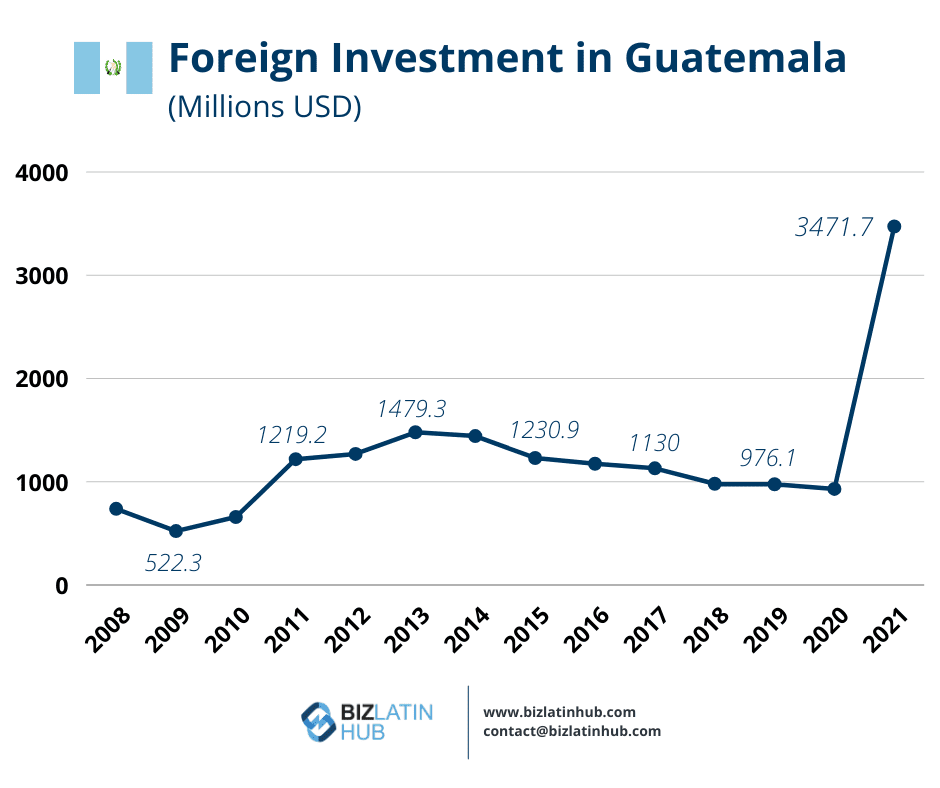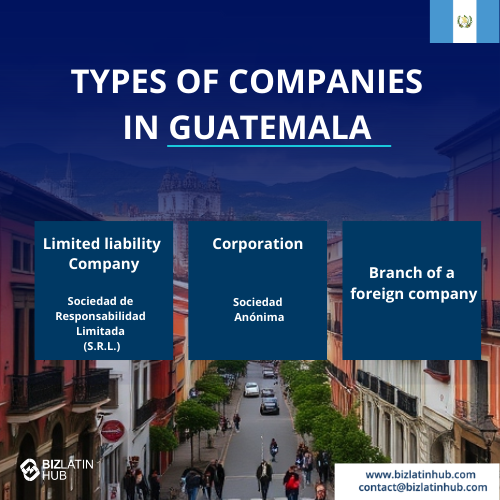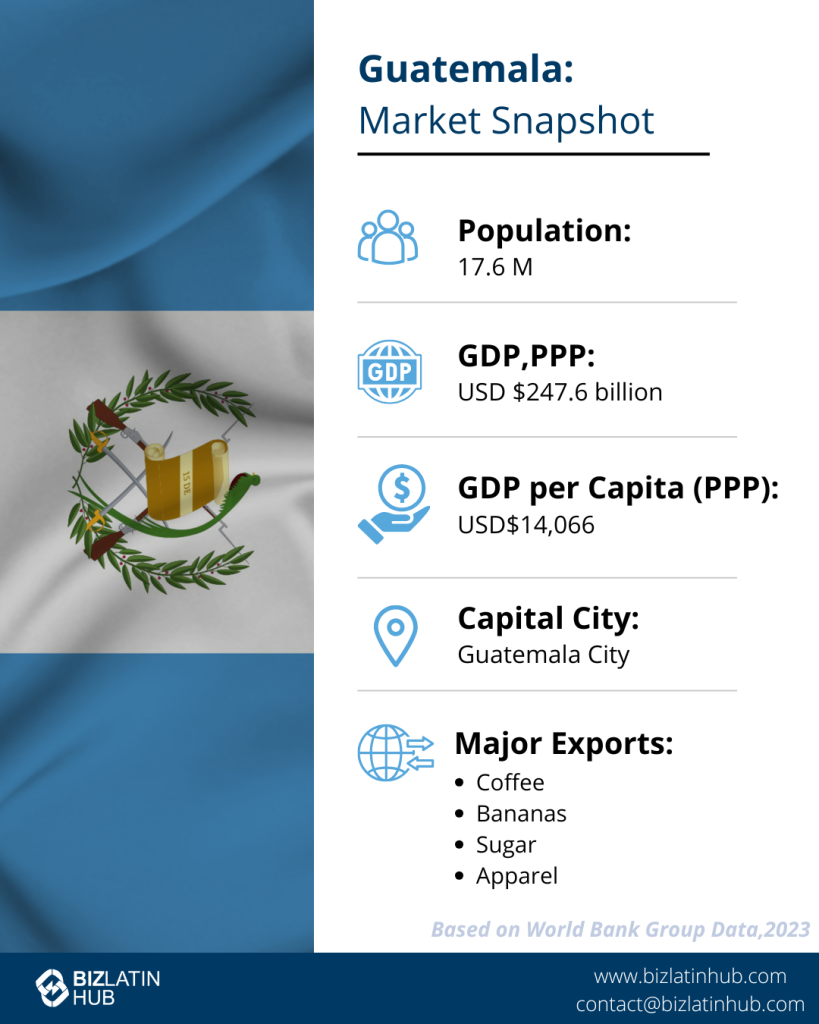With its consistently growing economy, tax-free economic zones and close proximity to the larger markets of Mexico and the United States, doing business in Guatemala might be the right choice for certain businesses and individuals. If you want to register a company in Guatemala, read on to find out more information and tips about the country.
Key takeaways on doing business in Guatemala
| Is foreign ownership allowed in Guatemala? | 100% foreign ownership is not an issue in the country, with no restrictions on how foreigners can operate in the economy when doing business in Guatemala. |
| Most important sectors in Guatemala | Guatemala has a famously large agricultural sector, which generates almost 10% of GDP. Manufacturing is even more important. With a massive garment producing industry at its center, it contributes 22% of the GDP. The country’s fastest-growing sector is services, and it is responsible for 60% of GDP. |
| Are there Free Trade Zones in Guatemala? | There are both public and private FTZs in Guatemala, as well as Special Economic Zones (SEZs). In total, there are ten now, after some were closed by a previous government. |
| Are there incentives for Foreign Direct Investment in Guatemala? | There are very few barriers for foreigners who are thinking of doing business in Guatemala. It’s an open, free-market economy, and almost all sectors of its economy are open to foreign investment. The Free Trade Zones offer exemption from some taxes under certain conditions in order to help promote FDI in the country. |
| What international links does the country have? | The country benefits from a range of agreements, most notably with the USA, all its neighbors, the EU and Mexico. |
What are the advantages of doing business in Guatemala?
Guatemala has a famously large agricultural sector, which generates almost 10% of GDP. Coffee, bananas, and sugar are some of the key agricultural exports. Manufacturing is even more important. With a massive garment producing industry at its center, it contributes 22% of the GDP.
The country’s fast-growing sector is services, and it is responsible for 60% of GDP. Some positives to doing business in Guatemala include the following:
- Guatemala is welcoming of foreign investment
- It boasts consistently strong economic growth
- Possesses a skilled labor force
- Is home to modern telecommunications infrastructure
- Has free trade agreements with the US, Central America
1. Open to foreign investment
There are very few barriers for foreigners who are thinking of doing business in Guatemala. It’s an open, free-market economy, and almost all sectors of its economy are open to foreign investment. Foreigners can own property such as vehicles and real estate free of any need for local co-signers, partners, or stakeholders, and there is no limit to how much of a company a foreigner owns.
There are also no restrictions concerning the maximum proportion of foreign shareholders in a business. In order to help promote FDI in the country, there are also Free Trade Zones that offer exemption from some taxes under certain conditions.
2. A consistently growing economy
The Central American country’s economy dwarfs its neighbors in terms of size. Guatemala represents 35 percent of the region’s GDP and has seen foreign direct investment grow by 376 percent since 2013. The principal sectors of the Guatemalan economy are manufacturing, services, and retail commerce.
Guatemala’s currency, the Quetzal, has been stable against the US dollar for the last decade – this alone might be reason enough to consider doing business in Guatemala. The country might not be spectacular in terms of growth spurts, but consistently matches or exceeds expectations on a strong and steady progression.

3. A skilled labor force
There is a large segment of the workforce that is well-educated and highly skilled – particularly among the young. Roughly 86 percent of young Guatemalan workers hold diplomas or degrees from colleges or universities. This is classed as any form of further education and means that the labor market is generally high quality.
Furthermore, Guatemala’s workforce is made up of about 6.7 million people, 70 percent of whom are under the age of 30. There are fewer local graduate vacancies than candidates, so for people or companies thinking of doing business in Guatemala, there is high supply in the labor market.
4. Modern infrastructure
Companies that are doing business in Guatemala have access to the robust telecommunications infrastructure of a highly privatized sector. Pretty much everyone has a smartphone in Guatemala – there are more than 20 million in the country, which is equivalent to 110 percent of the population.
In terms of logistics, there are ports on both the Pacific and Atlantic coasts, as well as connection to the Pan American Highway, meaning that goods can easily reach Asia, Europe, Africa and both the Americas. The road network has received upgrades in recent years, speeding up cross-country movement.
5. Free trade agreements with the US and Latin America
Those doing business in Guatemala will be able to take advantage of the free trade agreements that the government has negotiated. Among the countries with which Guatemala has free trade agreements are the entirety of Central America, the United States, Mexico, the Dominican Republic, Colombia, Panama, Chile, and the European Union.

What are some of the challenges of doing business in Guatemala?
Here’s a breakdown of the challenges that you should consider before doing business in Guatemala:
Bureaucracy is alive and well
Latin Americans seem to have a love affair with bureaucracy, and Guatemala is no different. When setting up a business there, be prepared for red tape – the country is rife with it. The relatively straightforward act of setting up a business in Guatemala can take up to 40 days to complete.
Notarized documents are required at various stages of the process and the business must be registered with several government and business entities. Legal representation is required for any business, so anyone doing business in Guatemala will have to hire a lawyer.
Corruption is widespread

The political situation in Guatemala is marked by continuing allegations of corruption and widespread calls for reform. As a consequence, in Guatemala many commercial successes are hard fought. A growing number of US stakeholders in the country have complained of rampant corruption in Guatemala and say that transparency is non-existent.
However, corruption tends to be industry specific, so people doing business in Guatemala may or may not encounter this, depending on the industry within which they operate. It’s also the case that a number of foreign owned companies are largely disconnected from this.
Internal security risk
While Guatemala is relatively stable economically, growth is distributed unequally, and rates of poverty remain high. Those doing business in Guatemala are probably well aware that the country has one of the highest violent crime rates in Latin America.
However, this is regional and relatively easy to avoid. Also, those crime rates remain high but they are falling and have been steadily reducing over the century to date. While this is not a thing that can be simply brushed aside, it’s also a manageable issue.
FAQs on doing business in Guatemala
Answers to some of the most common questions we get asked by our clients.
1. Can a foreigner own a business in Guatemala?
Yes, a business can be 100% foreign-owned by either legal persons (legal entities) or natural persons (individuals).
2. Are there Free Trade Zones in Guatemala?
| There are both public and private FTZs in Guatemala, as well as Special Economic Zones (SEZs). In total, there are ten now, after some were closed by a previous government. |
3. How long does it take to register a company in Guatemala?
lt takes between 8 to 10 weeks to form a company in Guatemala after all required information and documentation have been provided.
4. Which sectors are important in Guatemala?
Guatemala has a famously large agricultural sector, which generates almost 10% of GDP. Coffee, bananas, and sugar are some of the key agricultural exports. Manufacturing is even more important. With a massive garment producing industry at its center, it contributes 22% of the GDP. The country’s fast-growing sector is services, and it is responsible for 60% of GDP.
5. Does Guatemala have trade agreements with other countries?
Those doing business in Guatemala will be able to take advantage of the free trade agreements that the government has negotiated. Among the countries with which Guatemala has free trade agreements are the entirety of Central America, the United States, Mexico, the Dominican Republic, Colombia, Panama, Chile, and the European Union.
6. What entity types offer Limited Liability in Guatemala?
Both the S.A and S.R.L offer limited liability in Guatemala.
Biz Latin Hub Can Help You With Doing Business in Guatemala
At Biz Latin Hub, we provide integrated market entry and back-office services throughout Latin America and the Caribbean, with offices in major cities across the region. We also have trusted partners in many other markets.
Our unrivalled reach means we are ideally placed to support multi-jurisdiction market entries and cross-border operations.
As well as knowledge of doing business in Guatemala, our portfolio of services includes hiring & PEO accounting & taxation, company formation, bank account opening, and corporate legal services.
Contact us today to find out more about how we can assist you finding top talent or otherwise doing business in Latin America and the Caribbean.
If this article on the advantages and challenges of doing business in Guatemala was of interest to you, check out the rest of our coverage of the region. Or read about our team and expert authors.





